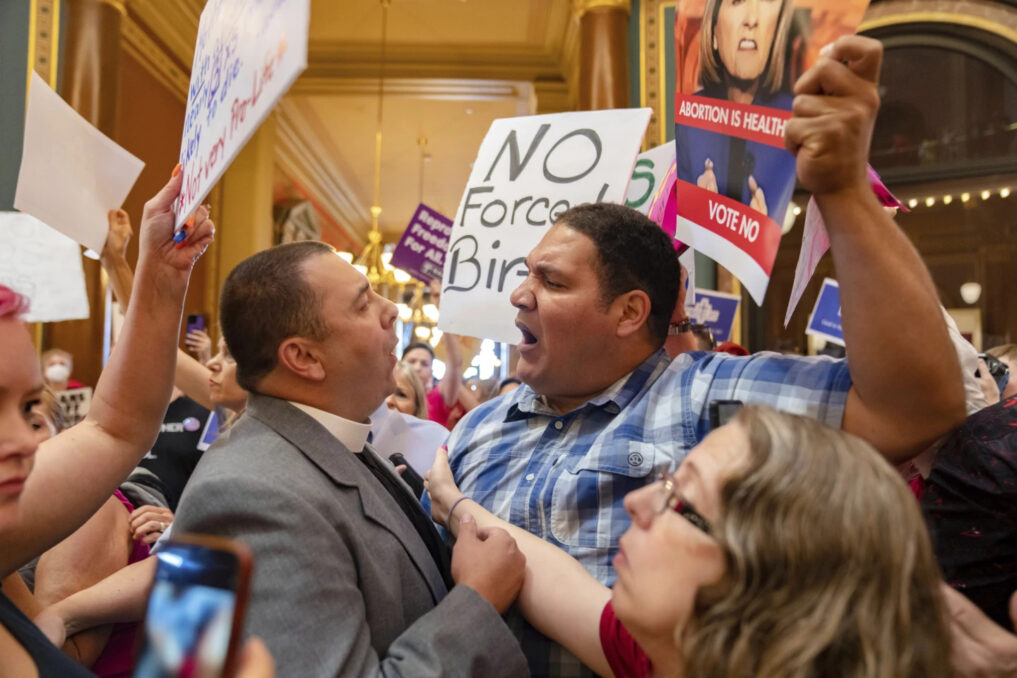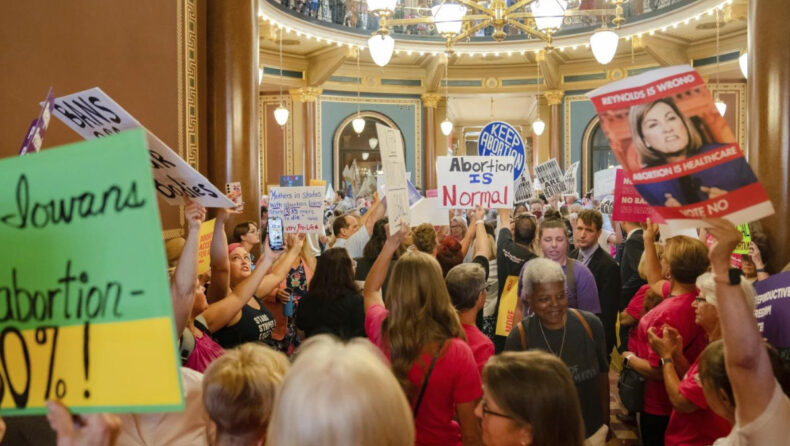In a marathon special session ordered by Iowa Governor Kim Reynolds, the state’s Republican-led legislature passed a Bill on Tuesday night aiming to ban abortions after six weeks of pregnancy. With the sole objective of restricting the procedure in the state, the anti-abortion Bill gained significant traction among GOP lawmakers.
Moments after the Bill was passed, Gov. Reynolds stated that she would sign the Bill on Friday, making the legislation come into force immediately. “Justice for the unborn should not be delayed,” Reynolds said after the session.
The Bill successfully made its way through both Houses of the state legislature in a single day, predominantly along party lines. The House of Representatives voted 56-34, while the State senators passed the Bill with a Republican majority, voting 32-17.
Restricting Abortion Rights in Iowa

Image Source: Associated Press
Senate File 579 makes it illegal for doctors to perform early abortions once a foetal heartbeat is detected, usually around six weeks into pregnancy, often before most women realize they are pregnant. The Bill does not make any exceptions for the pregnant woman’s age or mental health condition.
In response to the Iowa Supreme Court’s decision to uphold a 2019 ruling that struck down a previous “foetal heartbeat” abortion law, the Iowa legislature convened an extraordinary session. This development overturned the previous ruling, which had allowed abortions up to 20 weeks of pregnancy. Notably, Governor Kim Reynolds herself had been a prominent supporter of this stringent ban on abortion back in 2018.
Exceptions for Abortion
Amy Sinclair, the state Senate’s Republican president, said on Tuesday that the law would protect mothers as much as unborn foetuses. She further stated that the Bill did not impose criminal or civil liability on a woman for having an abortion.
The legislation will allow abortions until 20 weeks of pregnancy only in case of a medical emergency. Under the proposed legislation, abortions performed after six weeks would be permitted in specific circumstances. These exceptions include cases of miscarriages, situations where the pregnant woman’s life is in danger, and instances where foetal abnormalities are detected, leading to the inevitable death of the infant. Additionally, abortions would be allowed in cases where pregnancies are the result of reported rapes within 45 days or incest reported within 140 days.
Democratic Backlash on the Vagueness of the Bill

Democratic lawmakers’ efforts to amend the Bill to grant exceptions for pregnant children aged 12 or under remained futile, resulting in the Democrats criticizing the Bill as “child abuse.” The state House Minority Leader Jennifer Konfrst, after the passing of the Bill, said in a statement, “Women are not free when they cannot make their own healthcare decisions. And after today, women won’t be free.”
The Bill also leaves uncertainty regarding the penalties for physicians who violate the law, as the guidelines for such enforcement are left to Iowa’s board of medicine to determine.
Democratic legislatures and pro-choice advocates held large protests in the state Capitol throughout the day. Tensions escalated as pro-choice supporters clashed with pro-life advocates, who gathered at the Capitol to voice their support for the abortion ban.
The US Supreme Court overturned Roe v. Wade, dismantling 50 years of legal protection to the right to abortion and handing the authority on abortion law to individual states. Within just one year after Roe v. Wade, 15 states in the US have significantly curtailed or ceased almost all abortion services, with many Republican-led states imposing severe restrictions on access to abortion.













